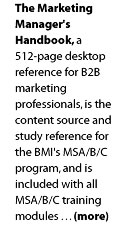


Tuesday Marketing Notes (Number 1—September 27th, 2005)
A Marketing Newsletter for BMA Members
Fighting "Black Box Mentality:" What Marketing Managers Need to Know About Marketing Execution
by Eric Gagnon
In watching news coverage of the government authorities who failed to respond before, during, and after Hurricane Katrina, I was struck by how those at the top treated the hands-on process of getting food and supplies into, and getting people out of, the area, as a “black box”—that is, a hands-off process delegated to functionaries and underlings, apparently out of the view, knowledge, and control of the people supposedly in charge.
For example, the Feds expected the initial disaster response would be handled by the “black box” called “local and state officials,” and—when overwhelmed by the event—state and local officials blamed the “black box” of the “federal government” for not getting involved more quickly.
Meanwhile, important logistical steps weren’t being taken, because, to be frank, those in charge didn’t know what they were doing.
Because of “black box mentality,” and subsequent buck-passing, people who could have been saved, or moved out of harm’s way—weren’t.
Does your company’s marketing effort suffer from this “black box mentality?”
Do you, or others on your marketing team, treat the process of day-to-day execution of the critical steps in your company’s marketing projects as if they’ve been planned and built within a “black box,” delegated to and controlled by someone else, and left unobserved until the final deliverable—ad, mailing, Web site, or other marketing project—pops out of this black box and into your marketing plan?
If so, you’re leaving your marketing program wide open to the most common cause of failure: Poor execution.
Execution is the Most Important Aspect of Marketing
Black box mentality ignores the most important aspect of marketing:
EXECUTION
Execution means your direct, daily, hands-on involvement in the basic steps of getting marketing projects done: Mailings to prospects, new advertising programs, next month’s trade show, or next quarter’s new Web site launch—the dozens of individual marketing projects that comprise your marketing program.
It’s a fact that marketing programs rise or fall based on how well they’re executed, and if they’re executed on time. Poor execution is the most common cause of failed marketing programs: Slipshod, late, or incomplete marketing projects, like missed placement deadlines for ads, or mailings that arrive too late to take advantage of a critical selling opportunity, or some other project that doesn’t get there on time, or—almost as bad—gets there with too much wheel-spinning, are the primary causes of failed, underperforming, dysfunctional B2B marketing programs.
Most of all, poor execution leads to missed selling opportunities, which puts the marketing manager responsible for poor performance on the bad side of their company’s sales team. In a B2B marketing and sales environment, where every marketing decision must be defended and justified by its contribution to sales, that’s a bad spot for any marketing manager to be.
And this Black Box Mentality—treating the execution of these critical projects in your marketing program as tasks to be handed off to someone else, with no direct involvement by you—is an open invitation to a failed marketing project, and a sure sign of a seriously dysfunctional marketing program.
Getting Out of the Black Box: Your Knowledge of Tradecraft is the Key
The first step to solving problems in your marketing program caused by poor marketing execution is knowing the tradecraft of marketing, or your knowledge of how a thing is done.
Knowing how ads, mailings, Web sites, PR programs, and other marketing projects are produced and executed helps you, and every member of your marketing team, execute every one of your marketing projects faster, better, and more efficiently.
Now, I know it’s likely as a marketing manager you won’t be writing your company’s sales copy, or producing ads or mailing pieces, or creating your company’s Web site, but you will be the one providing leadership on these projects when they’re done by your company’s ad agency and other outside vendors.
But even if you aren’t actually doing the project, you must know enough of the essential steps involved for each of these marketing projects to lead them through to their completion. You also need to know the unique characteristics, requirements, and scheduling for the individual kinds of marketing projects in your program to lead the other members of your team—copywriters, layout designers, Web designers, producers, and others—more effectively.
This way, at the very least, you can be sure that your own lack of knowledge, leading to poor preparation, scheduling, or implementation of a marketing project, wasn’t the cause of a marketing project that did not succeed.
So, what kind of marketing manager do you want to be? Someone who sits apart from the action, treating the process of each activity in your marketing program like a “black box”—a mysterious, intimidating, and uncontrollable process with a final product and outcome controlled by “disinterested others” and, therefore, inherently prone to failure?
Or, would you rather be the knowledgeable, confident leader of your marketing program, who’s not afraid to “walk the line” with a copywriter, layout designer, printer, mailing house manager, ad production coordinator, or Web producer—to give these important members of your marketing team the advice, guidance, and support they need to do your marketing projects well, and to get these projects out on time?
Which one do you want to be?
Respect for the Process
There’s something else: Your knowledge of marketing tradecraft also builds respect for the process. A marketing manager who knows the essential process of execution for every marketing project they’re running also knows what they can ask for, and realistically expect, from outside vendors during the limited time schedules allowed in most marketing projects.
This helps to minimize poor execution caused by every marketing project being turned into an 11th hour fire drill because of the marketing manager’s lack of knowledge of the timing and steps involved in a process. Respect for the process by you to vendors and other members of your marketing team ultimately translates to respect for them, which often becomes mutual. And that’s a good thing.
Why Marketing Execution is Like Baseball—and How This is Important to You
A marketing manager and marketing team that execute well can take advantage of every opportunity to sell their company’s product, anytime, anywhere.
And nowhere is this more important than in start-up company, or for a new product launch in an established company, or any launch in a new market. That’s because the most likely outcome of marketing projects in these situations is neither a complete success nor total failure: Ad campaigns, mailings, and other new marketing initiatives in start-ups or new product launches often yield lower-than-expected initial response, requiring extensive modifications to respond to actual market conditions and prospect feedback.
In marketing for start-ups and product launches, like baseball, what counts is not the unrealistic expectation that you can hit a home run every time you go to bat, but how many times you can hit the ball every time you step up to the plate. And don’t forget that the best baseball players in history never hit the ball more than about 3 out of every 10 times they took a swing.
But in marketing—especially in start-ups and new product launches—what counts most are your “at bats:” That is, the number of times you can rapidly improve, modify, revamp, or re-initiate a marketing project, and get it developed and back online to generate sales inquiries and orders.
That’s the payoff of good, fast marketing execution: The ability to execute well gives you the additional “at bats” you’ll need to revise marketing deliverables, re-target your marketing program to new prospects, and do the other things you need to get your program back on track, generating good sales response for your company.
The more times you can execute, and re-execute, the more you learn about your market, and how to sell into your market. And the more you learn, the higher your chances for marketing success.
And none of this has anything to do with the vague principles, soft platitudes, and purple cows of what’s usually written on marketing these days. In its most basic form, good marketing is often just good execution—getting it done, day after day—combined with clear presentation, which is the topic of next week’s article.
_____________________________________________________________
Eric Gagnon (eric@realmarkets.net), president of sales and product development consulting firm GAA, is the author of The Marketing Manager’s Handbook, the master study guide for the Business Marketing Association’s Marketing Skills Assessment, Skill Builder, and Certification (MSA/B/C) programs.
For more information on The Marketing Manager’s Handbook, available to BMA members at a special discount, click here . . .
_____________________________________________________________




